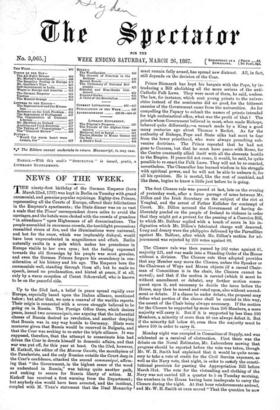Up to the 23rd inst., a belief in peace spread
rapidly over Europe, especially based upon the Italian alliance, mentioned below; but after that, we note a renewal of the warlike reports. Their origin is connected with a severe struggle believed to be going on in Russia. The Foreign Office there, which desires peace, issued two communiques, one arguing that the influential classes of Russia desired no revolution, and another denying that Russia was in any way hostile to Germany. Hints were moreover given that Russia would be reserved in Bulgaria, and that the Czar was seeking to re-enter the triple alliance. It was supposed, therefore, that the attempt to assassinate him had driven the Czar to devote himself to domestic affairs, and that war was put off, for this year at least. On the 23rd, however, M. Katkoff, the editor of the Moscow Gazette, the mouthpiece of the Panelavists, and the only Russian outside the Court deep in the Czar's confidence, attacked the second communique, affirm- ing that "the Government, in the highest sense of the word as understood in Russia," was taking quite another path, and seeking to secure for Russia liberty of action. M. Katkoff has received a first warning from the Department; but anybody else would have been arrested, and the incident, coupled with M. Tisza's statement that the Dual Monarchy
must remain fully armed, has spread new distrust. All, in fact, still depends on the decision of the Czar.














































